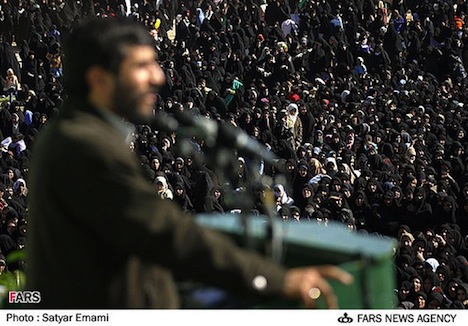Iranian president Mahmoud Ahmadinejad has never been one to shrink from a political battle — not during his breakthrough 2005 presidential campaign to his heated, not in his routine, over-the-top attacks against the United States and Israel, and not in his more recent fights with Iran’s Supreme Leader Ali Khamenei over personnel and other policy disputes.![]()
Ahmadinejad is limited to two consecutive presidential terms and therefore is not eligible to run for reelection in this month’s presidential race, so it was always certain that he would fade somewhat to the background as the race focuses on the six candidates hoping to succeed him. But it’s staggering to note just how minor a role Ahmadinejad has played in the campaign, especially in light of the fact that he was very recently attempting to boost Esfandiar Rahim Mashaei, his chief of staff, to the presidency, thereby giving Ahmadinejad a key role in Iranian affairs even after his own administration ends.
But the Guardian Council refused to permit Mashaei, to run for president earlier in May when it also disqualified former president Hashemi Rafsanjani as well. When Ahmadinejad tried to make Mashaei Iran’s first vice president in 2009, Khamenei made a rare and direct intervention into domestic politics to overrule the decision and ordered Ahmadinejad to replace Mashaei. Since his reelection four years ago, Ahmadinejad’s growing rift with principlists loyal to Khamenei have increasingly isolated him within Iran’s domestic political sphere.
One of the reasons why Mashaei is believed to be such a unique threat to the Supreme Leader is that he’s been willing to champion a form of Persian nationalism that harkens back to the time before Shi’a Islam took root in what’s now modern-day Iran. Mashaei’s ties to Ahmadinejad were forged three decades ago, when Mashaei served in the Revolutionary Guards and in Iran’s intelligence ministry during the 1980s war with Iraq. He joined Ahmadinejad’s city government when Ahmadinejad became Tehran’s mayor in 2003, and he held a key advisory role during Ahmadinejad’s first presidential term.
But there are other reasons why Khamenei and his conservative ‘principlist’ allies have been wary of Mashaei, including conciliatory comments towards Israel — he once remarked that Iranians are friends of Israelis. Furthermore, in a country where presidents are required to have religious as well as political credentials, religious conservatives have called Mashaei a ‘deviant’ due to Mashaei’s relatively relaxed views on matters such as the role of music and dancing in Iranian life to the wearing of the hijab. Ahmadinejad responded to Mashaei’s disqualification by claiming that Mashaei was ‘wronged,’ adding that he hoped Khamenei would intervene and call upon the Guardian Council to reconsider its decision, but those calls have been met with silence from both the Supreme Leader and the Guardian Council.
Since then, however, Ahmadinejad has remained uncharacteristically subdued, in a way that mirrors the relatively quiet role that the unpopular former U.S. president George W. Bush — a longtime Ahmadinejad foil — played in the 2008 presidential election.
Although critics of Iran’s political system have charged that the eight candidates approved by the Guardian Council are all conservatives (the field has now whittled down to six after two hopefuls dropped out earlier this week), they nonetheless represent a fairly wide range of generational, clerical and ideological diversity. Moreover, Ahmadinejad’s turbulent eight years in office have as been the target of much criticism throughout the election campaign, including as to his handling of Iran’s sputtering economy, growing inflation, widespread unemployment, and the way in which he’s isolated Iran’s position internationally, which has led to economic sanctions that have only exacerbated Iran’s economic woes.
None of the candidates in the race seem incredibly inclined to embrace Ahmadinejad.
The one potential exception is Saeed Jalili, Iran’s current negotiator with the P5+1 international powers over Iran’s nuclear energy program. Heralded as a frontrunner by the Western and Iranian media alike, Jalili is the closest thing to an incumbent in the race, and he’s absorbed criticism from both principlist candidates (such as Ali Akbar Velayati, a top international adviser to the Supreme Leader) and reformist candidates (such as Hassan Rowhani, who took a more conciliatory tone as Iran’s nuclear negotiator from 2003 to 2005). Continue reading The incredibly shrinking president: Ahmadinejad’s subdued role in Iran’s presidential race
